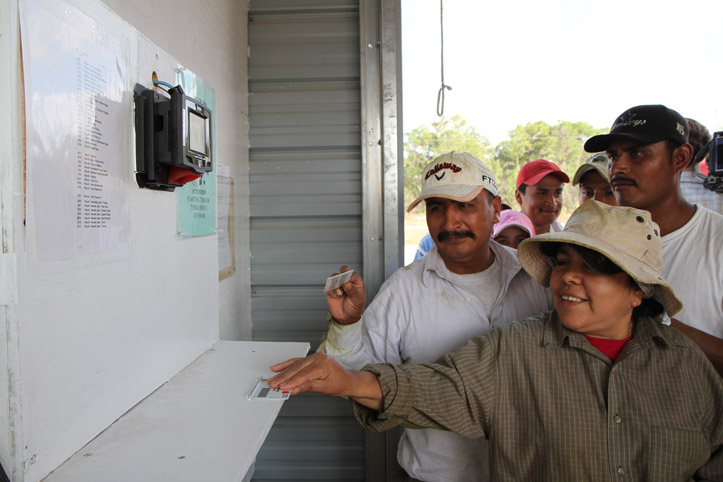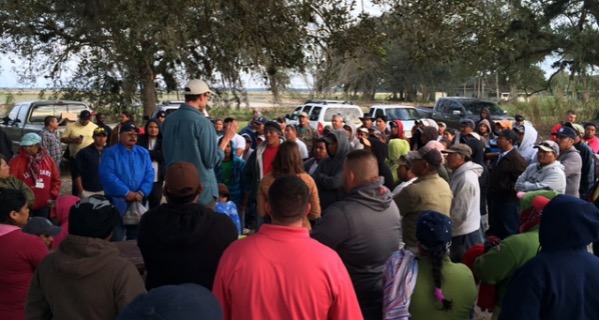[hupso_hide][hupso title=”Short title” url=”the URL”]
Multi-billlion dollar agribusiness giant files lawsuit after suspension for failing to correct violations
One one level, Del Monte Fresh Produce (Del Monte) and the Coalition of Immokalee Workers (CIW) are quite similar organizations. We are both exceptionally successful at what we do.
Del Monte makes money. They are that rarest of things – a produce company with an internationally recognized brand. Del Monte is a publicly traded company incorporated in the Cayman Islands, has farms across the globe, manages a fleet of 15 owned and six chartered refrigerated vessels, and operates four port facilities in the United States. They supply the world’s largest retailers in key markets from the United States, Germany, Japan, South Korea, and Hong Kong, to France, the United Arab Emirates and Saudi Arabia. With sales of just over $1 billion in the first three months of this year alone, they have turned pineapples, bananas, and a growing variety of fruits and vegetables into a multi-billion dollar business.
The CIW is a human rights organization. The CIW’s Fair Food Program has eliminated forced labor, sexual assault, and violence against workers in Florida’s tomato industry and caused everyday abuses such as wage theft and health and safety violations to become the rare exception rather than the rule in fields that had once been the backdrop for Edward R. Murrow’s famous documentary “Harvest of Shame.” Earlier this year, the Fair Food Program received a Presidential Medal for its extraordinary success against human trafficking in a White House ceremony; previously the CIW had received the Clinton Global Citizen Award, the Robert F. Kennedy Human Rights Award, and the Roosevelt Foundation’s Freedom from Want Medal for its success in protecting farmworkers’ human rights in Florida’s fields. The Fair Food Program has been called “the best workplace monitoring program” in the US in the New York Times and “one of the great human rights success stories of our day” in the Washington Post. Today the Fair Food Program is expanding into states outside of Florida and crops beyond tomatoes, and its worker-driven social responsibility model is being recognized as a promising new paradigm for protecting human rights in global supply chains in the 21st century.

In 2013, the paths of these two very successful organizations began to intersect. That year, Del Monte bought thousands of acres of farmland for tomato production in Florida and Virginia. Then one year ago, in the spring of 2014, Del Monte’s Florida operation came online, and as it did, the company joined the Fair Food Program, agreeing to abide by its standards and its regulations.
The makings of a great success story seemed to be coming together. On the one hand, the Fair Food Program had – in a unique partnership among farmworkers, Florida tomato growers, and more than a dozen major retailers — reformed an industry with perhaps the worst reputation for labor abuse in the US food industry and forged in its place what one public policy expert called “perhaps the best working environment in American agriculture.” On the other hand, Del Monte was coming into the Florida tomato industry with resources at its disposal beyond the wildest imagination of its competitors and the potential to lift the industry to even greater heights.
Del Monte crashes and burns…
But what happened next is anything but a success story. Instead, Del Monte entered the Fair Food Program and proceeded to rack up a record number of complaints for a wide range of labor rights violations, from wage theft to illegal recruiting fees for H2 workers from Mexico – violations that Del Monte recognizes and admits, it should be noted. On wage and hour complaints alone, Del Monte exceeded the number of complaints against all 26 other participating growers — combined – by a wide margin. When Fair Food Program monitors required Del Monte to fix its violations, the company agreed to implement two separate Corrective Action Plans but never actually made the necessary reforms. Finally, when the Fair Food Program suspended Del Monte for failing to fix its time keeping system (the source of so many of the wage and hour violations), the company sued the Fair Food Program rather than implement a time keeping system that other growers – all far, far, far smaller than Del Monte — had implemented without issue.

And so today, a multi-billion dollar, multi-national corporation seemingly determined to turn back the clock on farmworker rights in Florida is suing a farmworker organization responsible for building the program that helped forge a more modern, more humane Florida tomato industry. And the multi-billion dollar company is suing the farmworkers because the program the workers struggled to build for two decades functioned exactly as it is designed to function, exactly as it was defined in the agreement Del Monte signed when joining the program one year ago last March.
In short, Del Monte is suing the Fair Food Program for being the Fair Food Program, because Del Monte apparently wants to be allowed to violate its workers’ rights without consequence. In fact, it’s probably safe to say that Del Monte never intended to comply with the Fair Food Program’s human rights standards, but instead was determined to bend the program to Del Monte’s way of managing farm labor.
The Past, Unfortunately, Was in Fact Prologue
A quick Google search of Del Monte’s well-documented history of labor and human rights troubles would have raised a sea of red flags ahead of their entry into the Fair Food Program. Of course, Del Monte wouldn’t be alone among Fair Food Program participating growers with labor abuses in its past – that comes with the territory when a program undertakes to reform an industry once dubbed “ground zero for modern-day slavery” by federal prosecutors – but even by Florida’s standards, Del Monte’s track record of past abuses stands alone.

Here are just a few examples of recent lawsuits against Del Monte here in the US, which together provide a pretty good idea of Del Monte’s way:
- In 2011, the EEOC sued Del Monte Fresh Produce, five other farms, and the international labor recruiter Global Horizons, alleging a “pattern of national origin and race discrimination, harassment and retaliation against Thai workers who were brought into the US to work under the H2-A visa program.” According to an EEOC press release from March 2014, “High recruitment fees created a great debt for the Thai workers who faced abuses on the farms such as slapping, punching, humiliation, heavy surveillance, and threats of being shot, deported, or arrested.” According to that same press release, “Del Monte Fresh settled its lawsuit in November 2013 for $1.2 million along with extensive training and policy changes intended to safeguard the civil rights of farm workers.”
- In 2006, Del Monte Fresh Produce paid several hundred thousand dollars to workers in Oregon who had filed a class action lawsuit against the company for widespread violations of the Oregon wage and hour laws. As part of the settlement, Del Monte agreed to ensure workers the same violations would not occur in the future. A second suit was filed in 2007 when workers complained that the same illegal practices were occurring. According to the firm that filed the suits, “Del Monte denied wrongdoing; and asserted that even if there was an illegal practice, it was the fault of its labor contractor.” The case went to trial in September, 2009, and resulted in jury verdict that the same illegal practice had in fact been standard practice between January 1, 2006 and June 12, 2007. The jury further found that Del Monte had violated its promise to ensure that the wage and hour violations would cease. The jury verdict resulted in judgements totaling over two million dollars. Del Monte appealed the verdict to the Oregon Court of Appeals. On January 2, 2014, the Court of Appeals ruled across the board in favor of the workers.
- In 2010, Del Monte Fresh Produce settled a lawsuit filed by the Southern Poverty Law Center on behalf of 63 farmworkers who claimed “they were grossly underpaid while working for subsidiaries of the food giant Del Monte Fresh Produce.” Del Monte did not admit liability.
Disregard for time-keeping regulations, systemic wage violations, and a demonstrated failure to correct – all were hallmarks of Del Monte’s brief but tumultuous tenure in the Fair Food Program, and all were front and center in Del Monte’s inauspicious farm labor history ahead of its entry into the program. Together with reams of alarming reports on the intimidation of labor organizers and workers in Del Monte’s operations overseas – where even harsher abuses are more commonplace, but the obstacles for workers to defend their human rights in court are also much greater – the portrait of a company with little regard for the rights and welfare of farmworkers comes into focus.
Clearly, Del Monte entered the Fair Food Program with a demonstrable and long history of illegal farm labor practices. What couldn’t be known at the time that Del Monte sought to join the Fair Food Program, however, was how tightly the company would cling to those practices even after agreeing to join the “best workplace monitoring program” in US agriculture.
A Record Number of Complaints
Del Monte can claim distinction in one aspect of its brief time as a participating grower in the Fair Food Program: The Cayman Islands company set the record for the number of worker complaints against a single grower, and it wasn’t even close. Del Monte also set the record for payouts for acknowledged wage violations and for acknowledged illegal recruitment fees charged to H2 workers.

Here’s an extended excerpt from a brief prepared by the Fair Food Standards Council (FFSC) on Del Monte’s performance against the Fair Food Program’s standards, with highlights along four key dimensions:
- On Wage and Hour Complaints: … Even before DM executed its agreement with CIW, FFSC began to receive complaints from workers at Del Monte concerning missing wages for hours worked and piece-work performed, as well as health and safety and work environment abuses.
As detailed below, the company’s failures to properly compensate workers under the law and later the Code, has stemmed largely from the company’s failure to implement Code-compliant timekeeping and payroll systems. Instead the company continued to rely upon crewleader manual logs to record workers’ compensable hours and to generate payroll for workers.
Between 3/17/14 and 8/15/14, 63 wage claims were reported to the company, 55 of which were acknowledged by the company to be valid. Although most complainants’ paychecks or wage adjustment checks were ultimately issued, the prolonged delays resulted in many instances – impacting over 25 percent of all individual complainants – in which the addresses on file for complainants were no longer valid. Putting this in perspective, in less than half a growing season, Del Monte generated three times more wage complaints than 26 participating growers together in the FFP’s first full season of implementation. Nor was this a matter of scale, since several FFP participating growers employ at least as many workers as Del Monte and some employ significantly more workers.

These complaints also revealed a failure by the company to make legally required minimum wage adjustments, to ensure that piece-rate workers’ earnings do not fall below minimum wage. Although the company initially resisted the first such complaint and threatened retaliation against the complainant when the case was pursued by FFSC, the investigation disclosed that the company had failed to make minimum wage adjustments for workers, from the start of its Florida operations in January of 2014, through May 17, 2014. As a result, the company failed to make minimum wage adjustments for over 400 workers. The company’s review detected approximately 250 of these cases, and over 150 additional cases were brought to the company’s attention as a result of FFSC’s payroll audit.
- On Failure to Implement a Proper Time-Keeping System: … Del Monte’s failure to implement Code-compliant timekeeping and payroll systems which generated unprecedented numbers complaints concerning failure to provide proper compensation to workers, coupled with the company’s failure to provide prompt investigation and resolution of those complaints, resulted in probation status for Del Monte in the FFP, as of May 28, 2014.
As required by the Code and Guidance Manual, FFSC conducted its first audit in June of 2014. Numerous non-compliances of Code violations were documented, ranging from failure to properly register workers to complaint procedures and health and safety.
Most relevant to this motion were FFSC’s audit findings regarding the company’s failure to properly implement and utilize a Code-compliant timekeeping system to record workers’ compensable hours and to use that timekeeping system to generate payroll for workers. Instead, workers’ compensable hours were recorded on manual crewleader logs and these logs formed the basis of workers’ payroll hours. As a result, many compensable hours went unrecorded and uncompensated. Based on these findings, the company’s probation status in the FFP was confirmed.
- On the Failure to Fix Problems Identified in the Corrective Action Plans (CAPs): … As detailed below, the company agreed to and signed a CAP with measures that specifically addressed the non-compliances in its timekeeping and payroll practices…
… Del Monte continued to generate complaints at record levels for failure to properly compensate workers. Two hundred and nine (209) complaints were made by individual workers during the 2014-2015 season, 165 of which (79%) were acknowledged to be valid by Del Monte. This number of wage complaints generated by Del Monte during the 2014-15 season is more than ten times the number of wage complaints FFSC received for all 26 PGs during the program’s first full season of implementation.
In December of 2014, FFSC conducted its first remedial audit of Del Monte. On December 12, auditors were present at Del Monte’s Indiantown location when workers’ paychecks were distributed. Due to the large numbers of workers who wished to make complaints concerning failure to receive proper compensation, auditors took over one hundred individual complaints from workers at the field.
As detailed below, during the 2014-2015 season, auditors found in FFSC’s first, second and third remedial audits carried out in December of 2014 and January and February 2015, Del Monte continued to violate Code requirements and two CAPs, in which the company agreed to implement proper timekeeping systems and to base workers’ payroll on the records generated by those systems. Instead, workers’ payroll hours continued to be based on crewleader manual logs. When, as required by the Code and Appendix E of the Guidance Manual, the company was suspended from the FFP, this lawsuit was brought.
- On the General Working Environment and Del Monte’s Attitude toward the Fair Food Program: … Although not the reason for the company’s suspension, FFSC audit findings on the company’s lack of transparency and cooperation, as well as the number and type of qualitative complaints generated by the company in less than a full season of operation, are indicative of its disdainful attitude toward the FFP. Field-level supervisors openly mocked the FFP and were both verbally and physically aggressive towards auditors. In FFSC’s experience such attitudes start at the top of a grower’s operation. Furthermore, almost one hundred (100) workers have made individual complaints concerning work environment (sexual harassment, discrimination, and verbal abuse, including demeaning language and conduct toward African Americans and women), complaint procedures – including abusive and retaliatory behavior on the part of staff assigned deal with worker complaints – and health and safety.
Not a pretty picture. But failing wildly to comply with the Fair Food Code of Conduct is one thing. Refusing to correct those violations is something else altogether. And it was Del Monte’s refusal to fix its failing time system that eventually got the billion dollar agricultural giant suspended. What happened next was the culmination of the slow-motion train wreck that had been taking shape on Del Monte’s Florida farms since they opened for business in the spring of 2014.
Del Monte sues the Fair Food Program for… being the Fair Food Program
The Fair Food Program is a worker-driven social responsibility program with the primary objective of eliminating longstanding human rights abuses in Florida’s fields. It accomplishes its objectives through a combination of critical elements, one of which is real market consequences for the failure to comply with the requirements of the Fair Food code of conduct. Those market consequences are rooted in the CIW’s agreements with, today, thirteen retail food corporations that purchase Florida tomatoes. Those companies pledge, in binding agreements, to only buy Florida tomatoes from growers in good standing with the Fair Food Program, and to suspend purchases from growers suspended from the program.
It’s that last clause that prompted Del Monte to sue the CIW and the Fair Food Standards Council last month, despite the fact that Del Monte signed an agreement with the CIW upon entering the Fair Food Program that explicitly laid out the nature and triggers for those market consequences.

Before we get into the question of Del Monte’s reaction to its suspension, let’s get one thing clear from the outset: the Fair Food Program did not invent the idea of market consequences for violations of workers’ rights, it only made them real. Every single buyer that has signed a Fair Food agreement with the CIW had, before signing, a vendor code of conduct, and every single one of those codes required vendors to comply will all applicable laws – including wage and hour laws, laws against sexual harassment, laws against illegal recruiting fees for H2-A workers, and so forth. But those vendor codes of conduct were rarely, if ever, enforced, and so when human rights violations from forced labor to sexual assault and systematic failure to pay minimum wage were found, year after year, in Florida’s fields, growers almost never paid the price and tomatoes went uninterrupted to market.
That’s why those human rights violations continued unabated for generations of Florida farmworkers, and that’s why the Fair Food Program was born. Through binding agreements with the CIW, the thirteen retail food companies participating in the Fair Food Program are now effectively obligated to do what they claimed to do but didn’t do for years – only buy from growers who respect their workers’ fundamental human rights. Again, the CIW didn’t invent the idea of social responsibility, it just made it real.

And that is precisely what has Del Monte’s so outraged that they decided to sue the Fair Food Program when they learned that they actually have to comply with the Fair Food code of conduct or lose the right to sell tomatoes to some of the world’s largest retail food companies. No longer could they get away with gross labor violations on their farms because there would be – through the program’s worker-to-worker education process, complaint line, and rigorous audits – real oversight.
And no longer could they make false promises to fix violations when they were discovered, because – and this is the truly interesting thing in all of this sad story – their fellow growers, in partnership with the CIW in the Fair Food Program’s Working Group, chose to make failure to fix violations a cause for suspension on par with forced labor, sexual assault, and child labor. The Working Group is the truly remarkable body at the heart of the Fair Food Program partnership that reviews the implementation of the Fair Food code of conduct and creates what is called the Guidance Manual, the practical rules and regulations for the proper functioning of the Fair Food Program.
The growers in the Working Group decided early on in the Fair Food Program’s history to make failure to fix violations a cause for suspension because of the simple logic of competition: if each of us is going to make real and lasting investments to improve our operations, then no individual grower should be allowed to gain an advantage by refusing to make the same investments. Moreover, the growers reasoned, if we as an industry are going to spend the time and resources necessary to repair our collective image and set the new gold standard for human rights protections in the US agricultural industry, there’s no way we are going to let one grower throw that all away by scoffing at the rules and running a rogue operation. If you want to be in the Fair Food Program, you have to fix violations when they are discovered. If not, it is a voluntary program and you are free to leave.
Every grower, including Del Monte, agreed to abide by the Fair Food code of conduct and the Guidance Manual. Del Monte violated both, on multiple occasions, but it was their failure to fix their time-keeping system that ultimately got them suspended.
What Happens Next?
The CIW and the Fair Food Standards Council will fight this lawsuit and we will win.
But in the meantime, Del Monte — a multi-billion dollar banana and pineapple giant with a one-year old side business in tomatoes — will throw untold resources at the legal process to attack the Fair Food Program. They will claim that the farmworker organization – born twenty years ago in the dusty streets of one of the poorest communities in this country — is bullying the multi-national corporation by requiring them to comply with the agreement they signed back in the spring of 2014 to abide by the Fair Food Program’s human rights standards and regulations. They will try to overwhelm the program with all the tricks of the legal trade, and to impress the state court with high-powered attorneys and deep-pocketed legal strategies. They will try to strong-arm the program and the court system, but they will lose.
Because in the end it comes down to this: Del Monte agreed to abide by the Fair Food Program’s standards and regulations, and Del Monte failed to abide by those standards, so they were suspended. That may not be how most social responsibility programs work, but that is how the Fair Food Program works, and Del Monte knew it when they joined.
But while the legal proceedings move forward, what is truly interesting is what happens outside the courtroom. How will Del Monte’s customers, many of whom are participating buyers in the Fair Food Program, respond to the company’s abject failure to meet the program’s requirements and decision to attack the program rather than reform their operations? Is this the kind of supplier they want to do business with, or do they envision a higher ethical standard in their supply chain? ![]()
What about consumers at large? How will they respond when they see the familiar Del Monte logo on a pineapple or a bunch of bananas? Will they associate the company’s decision to attack “one of the great human rights success stories of our day” with the Del Monte logo wherever it appears?
So many questions, most of them yet to be answered, all of them prompted by Del Monte’s decision to sue the Fair Food Program rather than simply fix their time-keeping system as they had promised to do over and over again.
So stay tuned as this story develops, it promises to be a compelling one.
